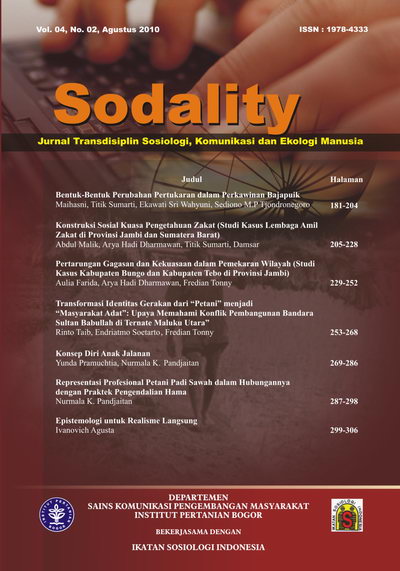RESENSI BUKU : Pollock, John L. and Joseph Cruz 2003. Contemporary Theories of Knowledge, Second Edition. Rowman & Littlefield: Lanham
Abstract
Bahwa dalam edisi pertama buku ini langsung digolongan menjadi buku klasik, menunjukkan kualitas isinya yang tinggi. Sedangkan edisi kedua ini, selain digunakan sendiri oleh John L. Pollock –profesor filsafat dan ilmu pengetahuan kognitif di Universitas Arizona—untuk mata kuliah Theory of Knowledge (Teori tentang Pengetahuan) yang dia asuh, buku ini juga digunakan di universitas-universitas lain. Telah puluhan buku lain yang menggunakan citasi dari buku ini. Bahkan banyak yang menyatakan bahwa buku ini jauh lebih bagus dalam menerangkan teori-teori pengetahuan dibandingkan dengan buku-buku serupa, bahkan yang terbit beberapa tahun kemudian, misalnya Introduction to ContemporaryEpistemology (1985) karya Jonathan Dancy, Groundless Belief edisi kedua (1999) dan Problems of Knowledge: A Critical Introduction toEpistemology (2001) karya Michael Williams, Epistemology: Classic Problems and Contemporary Responses (2002) karya Laurence BonJour, dan Knowledge (2001) karya Michael Welbourne (Traiger 2004).
Published
2010-05-02
How to Cite
AgustaI. (2010). RESENSI BUKU : Pollock, John L. and Joseph Cruz 2003. Contemporary Theories of Knowledge, Second Edition. Rowman & Littlefield: Lanham. Sodality: Jurnal Sosiologi Pedesaan, 4(2). https://doi.org/10.22500/sodality.v4i2.5842
Section
Articles
Authors who publish with this journal agree to the following terms:
- Authors retain copyright and grant the journal right of first publication with the work simultaneously licensed under a

This work is licensed under a Creative Commons Attribution 4.0 International License. that allows others to share the work with an acknowledgement of the work's authorship and initial publication in this journal. - Authors are able to enter into separate, additional contractual arrangements for the non-exclusive distribution of the journal's published version of the work (e.g., post it to an institutional repository or publish it in a book), with an acknowledgement of its initial publication in this journal.
- Authors are permitted and encouraged to post their work online (e.g., in institutional repositories or on their website) prior to and during the submission process, as it can lead to productive exchanges, as well as earlier and greater citation of published work (See The Effect of Open Access).





.png)









